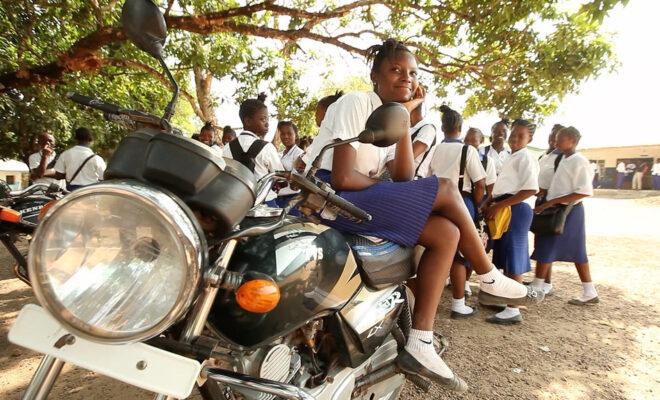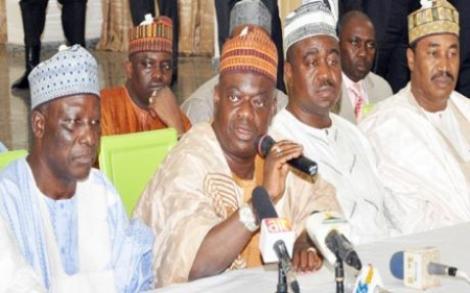Sierra Leone’s ban of pregnant school girls outlawed in landmark ruling

The ECOWAS court ruling could have important implications for Sierra Leone, external partners and other countries with similar bans.

A school girl in Sierra Leone sits on a motorcycle. Credit: GPE/Stephan Bachenheimer
Last month, in a milestone ruling, a regional court held that Sierra Leone’s ban on visibly pregnant girls from attending school and sitting exams is discriminatory. The Community Court of Justice of the Economic Community of West African States (ECOWAS) ordered that the policy be revoked with immediate effect. The decision is a resounding victory for girls’ rights in the region and the continent at large.
I documented the ban, imposed by the former education minister in 2015, while working as a human rights lawyer for Amnesty International. This research, together with relevant human rights law and standards, formed the basis of a third party intervention. The vast majority of girls we interviewed had become pregnant during the 2014-15 Ebola outbreak when there was an increase in teenage pregnancy, accompanied by a spike in sexual violence. The negative economic impact of the crisis led to an increase in exploitative and abusive relationships. Many girls had little information about sex education or access to contraceptives.
I was struck by the bravery of the girls and their determination to access education despite the obstacles. Some said they tied their stomachs so teachers could not tell they were pregnant, a risky strategy for their health. Others said they were prepared to face any stigma in order to continue in school and obtain a qualification, something that becomes more challenging for many girls after giving birth due to the lack of child care support.
As a member of ECOWAS, the regional court’s recent decision is binding for Sierra Leone. The West African bloc lacks the powers to directly enforce the ruling, but could in theory impose sanctions against a non-compliant government. Its intervention also provides an important advocacy tool for civil society in Sierra Leone and increases scrutiny of the government.
The court decision is an important test for President Julius Maada Bio’s administration, elected in 2018 on a platform of taking the country in a “new direction”. It is a chance for them to demonstrate their commitment to change, international law and the rights of all citizens.
Shortly after the ruling, President Maada Bio said: “We are guided by our commitment as a Government that every girl deserves to learn. No girl deserves to die. No child deserves to lose her life opportunities because an adult or peer who should know better gets her pregnant. No child deserves to be condemned to a life of illiteracy and poverty. No child deserves to not have a future.”
The Ministry of Education, now led by the forward-thinking David Sengeh, also announced the creation of a new Task Force on sexual and reproductive health focused on girls. This body could address orders from the regional court that Sierra Leone integrate sexual and reproductive health rights classes into the national school curriculum and develop strategies to address stigma and discrimination against pregnant girls. A first step in implementing this would be for government officials to refrain from using language that blames and shames pregnant girls – such as stating falsely that they are a negative influence on other girls – and instead address the factors behind teenage pregnancy such as high rates of sexual violence and exploitation.
A landmark ruling
The ECOWAS decision on the ban of pregnant girls from attending schools also raises several questions for the role of donor countries.
In early-2019, Sierra Leone was given $17.2 million grant by the Global Partnership for Education, funded by the likes of UK Aid, World Bank, European Union, Government of Ireland and UNICEF. It is vital these donors engage with the government in Freetown to ensure this funding is used to empower all children, especially girls in vulnerable situations, and that education is recognised as an inalienable right rather than a privilege to be taken away as a form of misguided punishment.
External partners should also assess the donor-funded alternative education scheme set up for pregnant girls that were banned from mainstream schools. The regional court also found this temporary measure, under which girls were taught limited subjects for a few days a week, to be discriminatory. Donors should nonetheless evaluate the initiative so that lessons can be learned in relation to similar interventions in the future. Several girls I spoke to had positive feedback about the scheme, whereas others said they would have preferred to continue in normal school where they could be taught all the subjects and obtain a qualification.
Finally, the ECOWAS decision demonstrates the importance of funding organisations supporting access to justice and women’s rights. International aid for access to justice has decreased by 40% over the past four years, yet legal cases can instigate systemic change both in the country being litigated and beyond. This recent court decision, for instance, has important implications not just for Sierra Leone but the likes of Tanzania and Equatorial Guinea, which similarly ban pregnant girls from school.
Such cases, however, can take several years to prepare and be decided. Sierra Leone’s was brought against the government in 2017 by the domestic civil society organisation WAVES, supported by two strategic litigation NGOs, Equality Now and the Institute for Human Rights and Development in Africa (IHRDA).
The landmark ECOWAS ruling last month was a crucial victory for girls’ rights, but for both activists in Sierra Leone and foreign donors, the next step is to use the judgement to hold the government to account and address more foundational issues. As activist Chernor Bah told me: “The Court decision is another tool for us to address the underlying issue of powerlessness of girls in our society and patriarchal attitudes. We believe that girls are powerful. We need to listen to their views and include them in decision making processes that affect them.”






OK